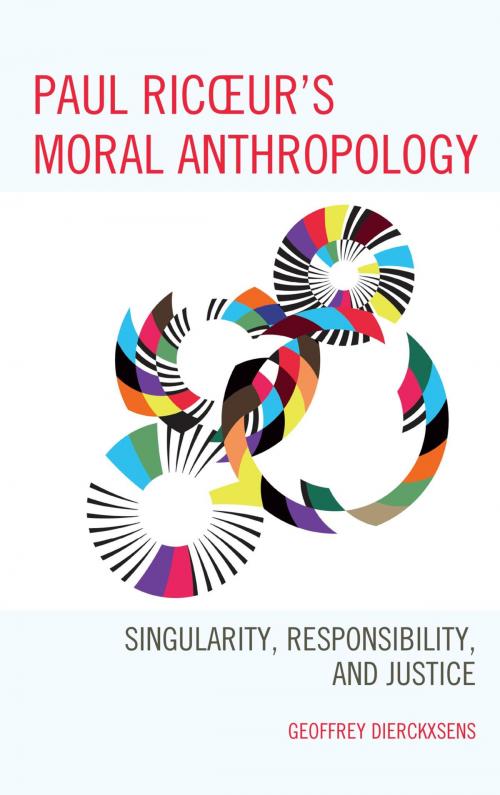Paul Ricoeur's Moral Anthropology
Singularity, Responsibility, and Justice
Nonfiction, Religion & Spirituality, Philosophy, Ethics & Moral Philosophy| Author: | Geoffrey Dierckxsens | ISBN: | 9781498545211 |
| Publisher: | Lexington Books | Publication: | December 20, 2017 |
| Imprint: | Lexington Books | Language: | English |
| Author: | Geoffrey Dierckxsens |
| ISBN: | 9781498545211 |
| Publisher: | Lexington Books |
| Publication: | December 20, 2017 |
| Imprint: | Lexington Books |
| Language: | English |
Paul Ricœur’s Moral Anthropology is a guide for readers who are interested in Paul Ricœur’s thoughts on morals in general, bringing together the different aspects of what Geoffrey Dierckxsens understands as Ricœur’s moral anthropology. This anthropology addresses the question what it means to be human, capable of participating in moral life. Dierckxsens argues that Ricœur shows that this participation implies being a self, living a singular lived existence with others and being responsible in institutions of justice. Through experiencing life one comes to learn taking moral decisions and the reasons for moral life.
The wager of Ricœur’s hermeneutical approach to moral anthropology is—so Dierckxsens argues—to understand moral life on the basis of the interpretation of lived existence, rather than on the basis of cultural or natural patterns only, like many contemporary moral theories in analytical philosophy. Ricœur’s moral anthropology is thus particularly timely in that it offers a critical argument against contemporary moral relativism and reductionism. By bringing together Ricœur’s moral anthropology, and recent moral theories this book offers a novel perspective on Ricœur’s already well-established moral theory.
Dierckxsens moreover offers a critical perspective by arguing that we should revisit certain moral concepts in Ricœur’s moral anthropology and in contemporary moral theories in analytical philosophy. He evaluates certain concepts in Ricœur’s work, such as the concept of universal moral norms and how it stands against cultural differences in morals. He moreover interrogates certain ideas of contemporary analytical philosophy, such as the idea of cultural moral relativism and whether we can find a common morality across the cultural differences. By placing Ricœur’s ideas on moral life within the context of the contemporary scene of moral theory, this book contributes well to Studies in the Thought of Paul Ricœur.
Paul Ricœur’s Moral Anthropology is a guide for readers who are interested in Paul Ricœur’s thoughts on morals in general, bringing together the different aspects of what Geoffrey Dierckxsens understands as Ricœur’s moral anthropology. This anthropology addresses the question what it means to be human, capable of participating in moral life. Dierckxsens argues that Ricœur shows that this participation implies being a self, living a singular lived existence with others and being responsible in institutions of justice. Through experiencing life one comes to learn taking moral decisions and the reasons for moral life.
The wager of Ricœur’s hermeneutical approach to moral anthropology is—so Dierckxsens argues—to understand moral life on the basis of the interpretation of lived existence, rather than on the basis of cultural or natural patterns only, like many contemporary moral theories in analytical philosophy. Ricœur’s moral anthropology is thus particularly timely in that it offers a critical argument against contemporary moral relativism and reductionism. By bringing together Ricœur’s moral anthropology, and recent moral theories this book offers a novel perspective on Ricœur’s already well-established moral theory.
Dierckxsens moreover offers a critical perspective by arguing that we should revisit certain moral concepts in Ricœur’s moral anthropology and in contemporary moral theories in analytical philosophy. He evaluates certain concepts in Ricœur’s work, such as the concept of universal moral norms and how it stands against cultural differences in morals. He moreover interrogates certain ideas of contemporary analytical philosophy, such as the idea of cultural moral relativism and whether we can find a common morality across the cultural differences. By placing Ricœur’s ideas on moral life within the context of the contemporary scene of moral theory, this book contributes well to Studies in the Thought of Paul Ricœur.















